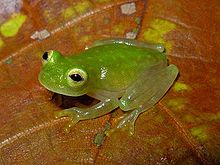Hyalinobatrachium
| Hyalinobatrachium | |
|---|---|

| |
| Hyalinobatrachium fleischmanni | |
| Scientific classification | |
| Kingdom: | Animalia |
| Phylum: | Chordata |
| Class: | Amphibia |
| Order: | Anura |
| Family: | Centrolenidae |
| Subfamily: | Hyalinobatrachinae |
| Genus: | Hyalinobatrachium and , 1991 |
| Type species | |
| Hylella fleischmanni Boettger, 1893
| |
| Species | |
|
33 species (see text) | |
Hyalinobatrachium is a genus of glass frogs, family Centrolenidae. They are widely distributed in the Americas, from tropical Mexico to southeastern Brazil and Argentina.[1]
Taxonomy and systematics[]
The genus is currently defined to include Hyalinobatrachium fleischmanni and its closest relatives.[1][2] Its sister taxon is Celsiella. Some species formerly in this genus are now in Vitreorana or Teratohyla.[2]
Description[]
Hyalinobatrachium have a bulbous liver covered by white pigment, a transparent parietal peritoneum, and lack a humeral spine in adult males. The bones are white in living animals. Males usually call from the underside of leaves. Females deposit one layer of eggs on the underside of leaves.[2]
Species[]
As of November 2021, these species are included in the genus:[1]
- Guayasamin, Vieira, Glor, and Hutter, 2019
- Twomey, Delia, and Castroviejo-Fisher, 2014
- Hyalinobatrachium aureoguttatum (Barrera-Rodriguez and Ruiz-Carranza, 1989)
- Hyalinobatrachium bergeri (Cannatella, 1980)
- Hyalinobatrachium cappellei (Van Lidth de Jeude, 1904)
- Castroviejo-Fisher, Padial, Chaparro, Aguayo-Vedia, and De la Riva, 2009
- Hyalinobatrachium chirripoi (Taylor, 1958)
- Hyalinobatrachium colymbiphyllum (Taylor, 1949)
- Hyalinobatrachium dianae Kubicki, Salazar, and Puschendorf, 2015
- Hyalinobatrachium duranti (Rivero, 1985)
- Hyalinobatrachium esmeralda Ruiz-Carranza and Lynch, 1998
- Hyalinobatrachium fleischmanni (Boettger, 1893)
- Hyalinobatrachium fragile (Rivero, 1985)
- Hyalinobatrachium guairarepanense Señaris, 2001
- Hyalinobatrachium iaspidiense (Ayarzagüena, 1992)
- Hyalinobatrachium ibama Ruiz-Carranza and Lynch, 1998
- Castroviejo-Fisher, Vilà, Ayarzagüena, Blanc, and Ernst, 2011
- Barrio-Amorós and Brewer-Carias, 2008
- Hyalinobatrachium mondolfii Señaris and Ayarzagüena, 2001
- Oliveira and Hernández-Ruz, 2017
- Hyalinobatrachium munozorum (Lynch and Duellman, 1973)
- Hyalinobatrachium orientale (Rivero, 1968)
- (Rivero, 1968)
- Hyalinobatrachium pallidum (Rivero, 1985)
- Hyalinobatrachium pellucidum (Lynch and Duellman, 1973)
- Hyalinobatrachium talamancae (Taylor, 1952)
- Castroviejo-Fisher, Ayarzagüena, and Vilà, 2007
- Hyalinobatrachium taylori (Goin, 1968)
- Castroviejo-Fisher, Vilà, Ayarzagüena, Blanc, and Ernst, 2011
- Hyalinobatrachium valerioi (Dunn, 1931)
- Hyalinobatrachium vireovittatum (Starrett and Savage, 1973)
- (Taylor, 1942)
- Hyalinobatrachium yaku Guayasamin, Cisneros-Heredia, Maynard, Lynch, Culebras, and Hamilton, 2017
AmphibiaWeb also lists Hyalinobatrachium petersi and Hyalinobatrachium lemur[3] but these are synonymized in the Amphibian Species of the World.[1]
References[]
| Wikimedia Commons has media related to Hyalinobatrachium. |
- ^ a b c d Frost, Darrel R. (2021). "Hyalinobatrachium Ruiz-Carranza and Lynch, 1991". Amphibian Species of the World: an Online Reference. Version 6.1. American Museum of Natural History. Retrieved 8 November 2021.
- ^ a b c Guayasamin, J. M.; Castroviejo-Fisher, S.; Trueb, L.; Ayarzagüena, J.; Rada, M.; Vilà, C. (2009). "Phylogenetic systematics of glassfrogs (Amphibia: Centrolenidae) and their sister taxon Allophryne ruthveni". Zootaxa. 2100: 1–97. doi:10.11646/zootaxa.2100.1.1.
- ^ "Centrolenidae". AmphibiaWeb: Information on amphibian biology and conservation. [web application]. Berkeley, California: AmphibiaWeb. 2017. Retrieved 17 June 2017.
- Hyalinobatrachium
- Glass frogs
- Amphibian genera
- Amphibians of Central America
- Amphibians of South America
- Taxa named by John Douglas Lynch